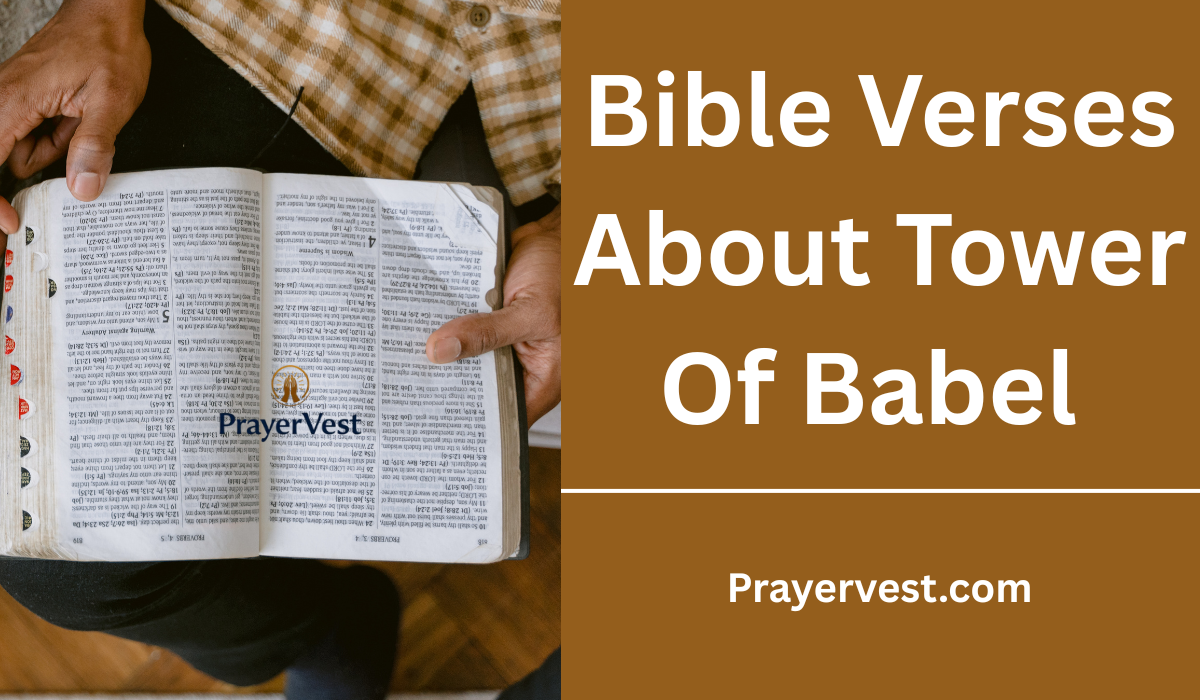One of the most important lessons in the Bible about human arrogance, divine authority, and the limits of ambition is contained in the Tower of Babel tale. Genesis 11:1–9 describes how people, bound together by a common language and goal, attempted to construct a tower that would reach the sky, signifying human success and autonomy from God.
However, they disregarded the Creator who gave them life in their quest for self-exaltation. This incident highlights the profound reality that harmony and true understanding come from surrender to God’s will, whereas unity away from Him breeds misunderstanding.
The Tower of Babel serves as a mirror to the human heart and is more than just an example of old architecture. In an effort to surpass heavenly authority, individuals have tried to build their own “towers” throughout history using riches, power, or intelligence.
However, the Bible teaches us that when human growth is unanchored in spirituality, it can lead to disunity and destruction. The languages’ dispersion at Babel represents both the breakdown of human purpose when it deviates from God’s plan and the fragmentation of communication. What started as a tribute to human achievement turned out to be evidence of divine intervention.


But there is also a message of hope and healing in the story of Babel. At Pentecost (Acts 2), when people from different nations heard the gospel in their native tongues, God restored unity even though He had jumbled human tongues at Babel. This potent reversal demonstrates that God’s ultimate purpose is redemption—bringing people back together under His truth—rather than division. Therefore, the Tower of Babel myth forces us to consider our motivations and serves as a reminder that genuine grandeur lies in allowing heaven to reside inside us rather than in ascending to heaven with human might.
40 Inspiring Bible Verses About Tower Of Babel (2026)
1. Genesis 11:1-2
“Now the whole world had one language and a common speech. As people moved eastward, they found a plain in Shinar and settled there.”
This verse sets the foundation for the story of the Tower of Babel. Humanity, unified by one language and purpose, began to dwell in Shinar, symbolizing a collective strength that would soon turn toward prideful ambition. The unity that could have been used to glorify God became the seedbed for rebellion. It underscores how even divine gifts like communication can be misused when detached from humility and divine purpose.
2. Genesis 11:3-4
“They said to each other, ‘Come, let’s make bricks and bake them thoroughly.’ They used brick instead of stone, and tar for mortar. Then they said, ‘Come, let us build ourselves a city, with a tower that reaches to the heavens, so that we may make a name for ourselves.’”
Here, the motivation behind the tower’s construction is revealed — human pride and the desire for self-exaltation. Instead of seeking God’s glory, they aimed to “make a name” for themselves. The use of human-made materials like bricks instead of natural stones reflects the substitution of divine reliance with human ingenuity. This verse captures the timeless temptation to pursue greatness apart from God.
3. Genesis 11:5
“But the LORD came down to see the city and the tower the people were building.”
This verse illustrates divine condescension — God “coming down” to inspect human activity. It’s not that God needed to see, but the imagery shows the vast gap between heaven’s majesty and human pretensions. Even the greatest human achievements require God to “come down” to observe them. It emphasizes the futility of human pride before divine sovereignty.
4. Genesis 11:6
“The LORD said, ‘If as one people speaking the same language they have begun to do this, then nothing they plan to do will be impossible for them.’”
God acknowledges the power of human unity and shared communication. This statement doesn’t praise their intent but recognizes the potential of collective will — for good or evil. It reveals that unity without obedience can become a dangerous tool of rebellion, capable of great harm when driven by pride or self-will.
5. Genesis 11:7
“Come, let us go down and confuse their language so they will not understand each other.”
God’s decision to confuse human language marks a pivotal moment in history. The act not only halted the tower’s construction but also introduced linguistic diversity to humanity. It symbolizes divine intervention to restrain human arrogance and redirect history toward dependence on Him. Communication, once the bond of rebellion, became the boundary that humbled humanity.
6. Genesis 11:8-9
“So the LORD scattered them from there over all the earth, and they stopped building the city. That is why it was called Babel—because there the LORD confused the language of the whole world.”
This conclusion to the Babel account marks both judgment and mercy. Humanity’s scattering was a divine act of discipline that prevented further rebellion but also fulfilled God’s command to “fill the earth.” The name “Babel” embodies confusion — a reminder of the limits of human ambition without God’s guidance.
7. Deuteronomy 32:8
“When the Most High gave the nations their inheritance, when he divided all mankind, he set up boundaries for the peoples according to the number of the sons of Israel.”
This verse echoes the aftermath of Babel — God establishing nations and boundaries according to His divine plan. It reveals that the scattering of people was not random but purposeful. God is the ultimate authority over human division and distribution, ensuring His sovereign order governs even the consequences of rebellion.
8. Psalm 33:10-11
“The LORD foils the plans of the nations; he thwarts the purposes of the peoples. But the plans of the LORD stand firm forever, the purposes of his heart through all generations.”
These verses reflect the same divine truth revealed at Babel: human plans may rise in arrogance, but God’s will always prevails. The tower builders sought permanence through their own effort, yet only God’s purposes endure. This passage reminds us that divine sovereignty outlasts human schemes and ambitions.
9. Isaiah 2:11-12
“The eyes of the arrogant will be humbled and human pride brought low; the LORD alone will be exalted in that day. The LORD Almighty has a day in store for all the proud and lofty.”
The pride that fueled the Tower of Babel mirrors the arrogance Isaiah warns against. God’s judgment on human pride is inevitable because He alone deserves exaltation. The imagery of being “brought low” parallels the downfall of Babel’s builders, reminding humanity that self-glorification leads to divine humbling.
10. Proverbs 16:18
“Pride goes before destruction, a haughty spirit before a fall.”
This proverb succinctly captures the moral essence of the Tower of Babel narrative. Pride, left unchecked, inevitably leads to ruin. The builders’ ambition to reach heaven resulted instead in dispersion and confusion. It’s a timeless warning that prideful pursuit of glory apart from God ends in collapse and chaos.
11. Psalm 2:1-4
“Why do the nations conspire and the peoples plot in vain? The kings of the earth rise up and the rulers band together against the LORD and against his anointed.”
This psalm vividly parallels the defiance seen at Babel. Humanity’s collective arrogance is portrayed as a rebellion against divine authority. The nations, much like those builders in Shinar, gather in unity — but a unity rooted in opposition to God. Yet their plotting is in vain, for God “sits in the heavens and laughs.” This passage reminds us that all human schemes against divine will are destined to fail, no matter how coordinated or powerful they seem.
12. Isaiah 14:13-15
“You said in your heart, ‘I will ascend to the heavens; I will raise my throne above the stars of God… But you are brought down to the realm of the dead, to the depths of the pit.’”
This prophetic passage about the fall of Lucifer mirrors the prideful intent behind the Tower of Babel. Both narratives center on humanity’s (or a being’s) desire to ascend beyond divine limits and claim the heights of heaven. Yet both end in humiliation and descent. The Tower’s builders and the fallen angel share the same fatal flaw — the illusion that created beings can rival the Creator.
13. Jeremiah 50:29-32
“Repay her for her deeds; do to her as she has done. For she has defied the LORD, the Holy One of Israel. I am against you, you arrogant one, declares the Lord, the LORD Almighty.”
Here, Babylon — the spiritual descendant of Babel — becomes a symbol of arrogance and defiance against God. The Lord’s declaration, “I am against you, you arrogant one,” echoes the divine resistance to pride seen since the earliest days in Shinar. It reveals a consistent biblical theme: from Babel to Babylon, human pride invites divine opposition, while humility attracts His grace.
14. Daniel 4:30-32
“Is not this the great Babylon I have built as the royal residence, by my mighty power and for the glory of my majesty?”
King Nebuchadnezzar’s boast about Babylon perfectly reflects the spirit of Babel — human pride disguised as accomplishment. His declaration exalts human might and architectural grandeur, yet within moments, God humbles him. The same voice that once claimed self-glory is reduced to beast-like madness. This verse demonstrates that prideful nations and leaders follow the same tragic pattern that began at Babel.
15. Zephaniah 3:9
“Then I will purify the lips of the peoples, that all of them may call on the name of the LORD and serve him shoulder to shoulder.”
This prophecy reverses the judgment at Babel. Where once God confused human speech, here He promises to purify it — not for rebellion, but for worship. The scattering of tongues will one day give way to united praise. The verse reveals God’s redemptive intention behind Babel’s confusion: to ultimately restore unity in righteousness, not rebellion.
16. Acts 2:4-6
“All of them were filled with the Holy Spirit and began to speak in other tongues as the Spirit enabled them… each one heard their own language being spoken.”
At Pentecost, the Holy Spirit reverses the division caused at Babel. Instead of confusion, there is divine clarity. Different tongues now serve the purpose of spreading God’s message, not elevating human pride. This is a direct spiritual response to Babel’s corruption of unity — showing that only through the Spirit can true harmony among nations be achieved.
17. Revelation 14:8
“Fallen! Fallen is Babylon the Great, which made all the nations drink the maddening wine of her adulteries.”
This prophetic declaration marks the end of the spiritual legacy of Babel. Babylon, the symbol of human pride, corruption, and rebellion against God, finally collapses under divine judgment. It signifies the ultimate futility of any empire or ideology that seeks to glorify humanity over the Creator. What began as a tower of pride ends as a monument of ruin.
18. Revelation 18:2
“With a mighty voice he shouted: ‘Fallen! Fallen is Babylon the Great!’ She has become a dwelling for demons and a haunt for every impure spirit.”
The Tower of Babel’s ambition finds its final echo here. Babylon’s spiritual decay represents the culmination of human rebellion and self-worship. Once a symbol of progress and power, it becomes a desolate ruin — a dwelling of impurity. This verse underscores that without God, human greatness inevitably turns to corruption and spiritual emptiness.
19. 1 Corinthians 1:19-20
“For it is written: ‘I will destroy the wisdom of the wise; the intelligence of the intelligent I will frustrate.’ Where is the wise person? Where is the teacher of the law? Has not God made foolish the wisdom of the world?”
Paul’s teaching reflects the same divine principle that operated at Babel. God frustrates human intellect when it rises against His authority. What people call wisdom often becomes folly when divorced from divine truth. The builders of Babel believed in their collective genius, yet God rendered their communication useless. This verse reiterates that God’s wisdom surpasses the limits of human intellect.
20. James 4:6
“But he gives us more grace. That is why Scripture says: ‘God opposes the proud but shows favor to the humble.’”
The fate of Babel’s builders is a living illustration of this truth. God resists the proud — not out of cruelty, but as an act of correction. Pride distances humanity from divine favor, while humility draws us closer to grace. The contrast between Babel’s scattered builders and God’s humble servants reveals the enduring truth that divine favor rests not on human ambition, but on submission to God’s will.
21. Proverbs 21:30
“There is no wisdom, no insight, no plan that can succeed against the LORD.”
This proverb captures the divine verdict on all human endeavors that oppose God’s will — including the Tower of Babel. The builders’ unified strategy and intellectual collaboration were no match for divine sovereignty. No matter how advanced human knowledge becomes, it can never overrule or outwit the purposes of God. This verse reinforces the truth that divine authority reigns supreme over all human ambitions.
22. Psalm 127:1
“Unless the LORD builds the house, the builders labor in vain. Unless the LORD watches over the city, the guards stand watch in vain.”
The Babel project was a labor of vanity because it lacked divine partnership. This psalm reminds us that every human effort — whether in building, guarding, or planning — must rest upon God’s foundation. The builders of Shinar erected walls and towers, but without God’s blessing, their work crumbled into confusion. True success in any endeavor flows from God’s direction, not human determination.
23. Isaiah 40:22-23
“He sits enthroned above the circle of the earth, and its people are like grasshoppers. He brings princes to naught and reduces the rulers of this world to nothing.”
These verses magnify God’s sovereignty in contrast to human smallness. The imagery of God seated above the earth shows the futility of earthly pride. The people who sought to “reach heaven” through a tower are described here as mere grasshoppers before the Creator’s majesty. This passage humbles the soul, reminding us that the One who rules heaven and earth alone is worthy of exaltation.
24. Job 9:4-5
“His wisdom is profound, his power is vast. Who has resisted him and come out unscathed? He moves mountains without their knowing it and overturns them in his anger.”
Job’s words highlight the absolute futility of resisting God’s will. The builders of Babel resisted divine authority through prideful construction, yet none can withstand the power of the Almighty. Job’s question — “Who has resisted Him and come out unscathed?” — finds its answer in Babel’s downfall. This verse stands as a universal truth: human defiance, no matter how united or clever, cannot prevail against divine power.
25. Psalm 115:3
“Our God is in heaven; he does whatever pleases him.”
This declaration affirms God’s unchallenged sovereignty over creation. The tower builders sought to “reach the heavens,” symbolically challenging God’s domain. Yet this verse reminds us that heaven belongs to God alone. His purposes are not bound by human intention or architecture. It reinforces the eternal reality that God’s will stands independent of human approval or interference.
26. Jeremiah 9:23-24
“Let not the wise boast of their wisdom or the strong boast of their strength or the rich boast of their riches, but let the one who boasts boast about this: that they have the understanding to know me.”
This passage dismantles every human reason for pride — intellect, power, and wealth — all of which undergirded Babel’s ambition. The tower builders gloried in their collective genius and material progress, but Jeremiah redirects the focus to knowing God as the only true source of boasting. This verse reveals that divine knowledge, not human achievement, is the highest mark of wisdom.
27. Isaiah 25:11-12
“He will bring down their pride despite the cleverness of their hands. He will bring down your high fortified walls and lay them low.”
Isaiah’s words vividly echo the fate of Babel. God opposes human pride expressed through the “cleverness of hands” — the very thing that defined the builders’ innovation. Their “fortified walls” were symbols of independence from God, yet even the strongest human defenses collapse under divine judgment. This verse is a poetic portrayal of God’s ability to humble even the mightiest human creations.
28. Psalm 89:11
“The heavens are yours, and yours also the earth; you founded the world and all that is in it.”
This verse declares God as the rightful owner and architect of all creation — a truth forgotten by those who sought to construct a manmade path to heaven. The builders of Babel tried to claim dominion over heaven’s heights, but Psalm 89 reestablishes divine ownership. Every structure, nation, and people belong to God; humanity cannot build its way into divine authority.
29. Ecclesiastes 3:14
“I know that everything God does will endure forever; nothing can be added to it and nothing taken from it. God does it so that people will fear him.”
The Tower of Babel symbolizes humanity’s attempt to “add” to what God had already designed — unity through obedience and diversity through purpose. But as this verse explains, only God’s works endure eternally. Human endeavors, however monumental, crumble with time. The enduring nature of God’s creation contrasts sharply with the fleeting nature of human ambition, prompting reverent awe and humility before His eternal power.
30. Habakkuk 2:12-14
“Woe to him who builds a city with bloodshed and establishes a town by injustice! Has not the LORD Almighty determined that the people’s labor is only fuel for the fire?”
Habakkuk denounces the kind of oppressive ambition that characterized Babel. Their city-building was rooted not in justice but in prideful self-glorification. God declares that such efforts are “fuel for the fire” — destined for destruction. Yet the passage ends with a contrast: “The earth will be filled with the knowledge of the glory of the LORD.” This reveals that God’s glory, not human monuments, will ultimately fill the earth.
31. Micah 6:8
“He has shown you, O mortal, what is good. And what does the LORD require of you? To act justly and to love mercy and to walk humbly with your God.”
This verse contrasts the spirit of Babel with the spirit God desires. The tower builders sought fame and elevation; God seeks humility, justice, and mercy. Micah’s message reminds humanity that walking humbly with God is greater than any tower of human pride. The true path upward is found not through construction but through submission — not through self-glory, but through godly obedience.
32. Psalm 9:19-20
“Arise, LORD, do not let mortals triumph; let the nations be judged in your presence. Strike them with terror, LORD; let the nations know they are only mortal.”
The people of Babel acted as though they could rival divine authority, forgetting their mortality. This psalm reaffirms the distinction between Creator and creation. God’s intervention at Babel served this very purpose — to remind humanity of its limits. The prayer here echoes that divine act: that the nations recognize their frailty and learn reverence before the eternal God.
33. Jeremiah 51:53
“Even if Babylon ascends to the heavens and fortifies her lofty stronghold, I will send destroyers against her,” declares the LORD.
This verse directly mirrors the ambition of Babel — “ascending to the heavens.” God’s response is the same across generations: prideful elevation invites divine downfall. Babylon, the symbolic heir of Babel’s arrogance, thought herself invincible. Yet even fortified heights cannot shield against divine justice. This verse shows that no human empire or ideology can build high enough to escape God’s reach.
34. Psalm 94:11
“The LORD knows all human plans; he knows that they are futile.”
The builders of Babel crafted elaborate plans to immortalize their legacy, but this psalm declares that human schemes apart from God are doomed to fail. God’s omniscience exposes the futility of every self-centered design. This verse emphasizes that success without divine direction is a mere illusion — human wisdom will always fall short of divine purpose.
35. Isaiah 30:1-2
“Woe to the obstinate children, declares the LORD, to those who carry out plans that are not mine, forming an alliance, but not by my Spirit, heaping sin upon sin.”
This passage could describe the very attitude of those who built the Tower of Babel. They formed alliances and pursued grand plans independent of God’s Spirit. Isaiah exposes the folly of such self-reliance — it multiplies sin rather than producing success. The same rebellion that united humanity in Shinar continues wherever people build without seeking God’s counsel.
36. Proverbs 19:21
“Many are the plans in a person’s heart, but it is the LORD’s purpose that prevails.”
This verse encapsulates the heart of the Babel story. Human beings can design and dream endlessly, but God’s purpose overrides all. The builders envisioned a tower that would secure their fame forever, yet God’s intervention redirected history. It’s a timeless reminder that no human project, policy, or pursuit can surpass the enduring purposes of the Lord.
37. Isaiah 45:9
“Woe to those who quarrel with their Maker, those who are nothing but potsherds among the potsherds on the ground.”
This imagery paints a vivid picture of humanity’s rebellion against God. The tower builders, like clay arguing with the potter, attempted to redefine divine boundaries. Isaiah’s warning confronts that same spirit of defiance. When creation contends with its Creator, chaos follows. This verse reaffirms that humility before the Maker is the only foundation for peace and stability.
38. Daniel 2:21
“He changes times and seasons; he deposes kings and raises up others. He gives wisdom to the wise and knowledge to the discerning.”
This verse celebrates God’s sovereignty over human history — a theme central to the fall of Babel. Just as He scattered the builders and redefined nations, God continues to direct the rise and fall of kingdoms. Human plans may dominate for a moment, but divine providence shapes the long arc of history. It is God who ordains change, not human ambition.
39. Zechariah 4:6
“‘Not by might nor by power, but by my Spirit,’ says the LORD Almighty.”
The Babel builders relied on their might, intellect, and unity to accomplish their goal. In contrast, Zechariah’s message reveals the true source of enduring strength — the Spirit of God. Lasting achievement in the divine sense does not come through human force or strategy but through divine empowerment. This verse stands as a direct rebuttal to the philosophy of Babel, affirming that only Spirit-led endeavors endure.
40. Revelation 19:6
“Then I heard what sounded like a great multitude, like the roar of rushing waters and like loud peals of thunder, shouting: ‘Hallelujah! For our Lord God Almighty reigns.’”
This climactic verse offers the final reversal of Babel’s confusion. Where once humanity’s voices were scattered in chaos, here they are unified in worship. The multitude speaks not in rivalry but in harmony, proclaiming God’s eternal reign. The story that began with a tower of pride ends with a throne of praise — the ultimate vindication that God alone is worthy of glory, power, and exaltation forever.
Conclusion
Human success, no matter how great, must be based on humility and obedience to God, as the Tower of Babel story serves as an eternal reminder. Confusion and conflict resulted from the builders’ attempts to establish a reputation. This story illustrates the pointlessness of aiming for greatness without heavenly guidance. It teaches that growth and unity are only significant when they are focused on God’s will rather than individual aspirations. True wisdom is found in creating lives that honor the Creator who rules the heavens, not in erecting structures that reach the sky.
In the end, the Tower of Babel serves as a reminder of the larger narrative of redemption realized in Christ. Jesus restores and unites people through the Spirit, but Babel dispersed humanity through confusion. By enabling people of various languages to comprehend the message of salvation at Pentecost, God undid the curse of Babel. This striking contrast demonstrates how God’s purpose has always been to unite His people under His truth as a single family. The lesson of Babel challenges us to put aside our arrogance, adopt humility, and cooperate under God’s direction so that His glory, not ours, serves as the ultimate cornerstone of whatever we construct.






